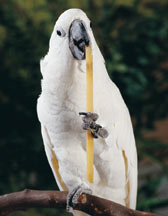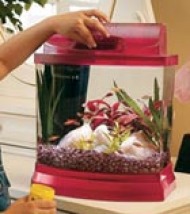Interactions with other pets
Veterinary & Aquatic Services Department,
Drs. Foster & Smith, Inc.
- Extreme care should be taken when introducing your bird to other pets, including other birds. It is natural instinct for wild canines and felines to prey on birds. Sometimes the reverse is true, and a large bird can actually be more aggressive. Animal bites can cause severe injuries and be fatal. If your bird is bitten, always seek veterinary attention.
- Never leave a loose bird unattended in a room with another pet, even if they appear to get along well together. It is always better to be safe than sorry.
- Place bird cages where they cannot be tipped over by inquisitive or predatory behaviours of other pets.
- Cover all aquariums to prevent your bird from accidental drowning, ingestion of lead weights used on some plants, and drinking the water that may contain infectious organisms or chemicals used to treat the water.
- Prevent birds from having access to corncob or hay bedding used for small pets. These may contain moulds or cause digestive problems.
- Keep cat litter boxes out of the reach of birds. The dust and scent may cause respiratory problems, and ingestion could result in obstructions of the digestive tract.
- Keep water dishes out of the reach of birds, since birds can drown in even a small amount of water.
- Prevent access to areas where heat lamps are used, such as housing for reptiles. These can cause burns and the covers may give off toxic fumes if coated with polytetrafluoroethylene (PTFE).
- Keep all flea and tick sprays and pet medications and supplements – especially those that are flavoured – out of the reach of birds.
- Prevent birds from having access to corncob or hay bedding used for small pets. These may contain moulds or cause digestive problems.


